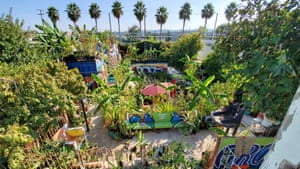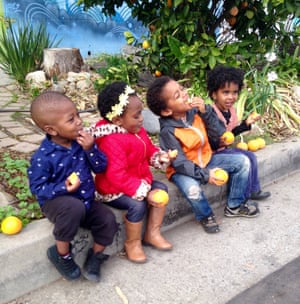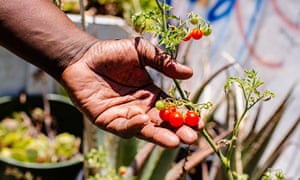“The garden seduces me,” says Ron Finley, who is known around the world as the “gangsta gardener”. “I’ll get out there at 9am and next thing I know it’s 7pm … gardening takes your mind off things. Everybody should have a garden to cultivate.”
English horticulturalists fiddling with well-maintained roses might know the feeling. But for Finley, gardening isn’t about producing the perfect floral pom-pom, it’s about growing people. Planting is his unusual form of protest, and having a garden stuffed full of beautiful plants and vegetables is a byproduct of that.
To many, this will seem a surprising way to rebel, but Finley lives in what he calls a “food prison”. South Central Los Angeles is a predominantly black and Latino neighbourhood known for liquor stores, vacant lots, drive-throughs and drive-bys. Due to its favourable climate this should be the market garden of America but home-grown produce is an alien concept to many.
Q&A What is wild cities week?
Show
Hide
This week, the Guardian’s Age of Extinction site is looking at biodiversity in cities and urban areas around the world, shining a spotlight on the under-appreciated world of nature hidden among the highrises and busy roads.
Around 55% of the world’s population live in urban areas and that number is projected to rise to 68% by 2050. Nature’s role in the wellbeing and happiness of billions of people will be more important than ever. While urbanisation is a major driver of biodiversity loss, many conservationists and town planners are trying to make built-up areas more nature-friendly. The role of green spaces in urban areas has even been formalised in a draft UN agreement to halt and reverse biodiversity loss, often referred to as the Paris agreement for nature.
The Covid-19 outbreak has seen cities and towns across the world go into lockdown which has enabled wildlife such as wild boar, deer, monkeys, foxes and even lions to venture into territory previously dominated by humans. It has also offered us the chance to notice and appreciate the natural world in cities in an unprecedented way.
In this special series of reports we’ll be looking at how animals and plants adapt to city life, what to look out for right now and how we can encourage more wild cities in the future.
Since lockdown, gardening has turned into a survival impulse. All over the world, seed suppliers are running out of stock – when it comes to panic-buying, carrot and courgette seeds are the new toilet roll. Even live chicken sales have spiked. The Good Life is back in fashion.
For most people self-sufficiency will always remain a dream, but that hasn’t stopped improbable gardens sprouting up in windowboxes, back yards and balconies since lockdown. “Gardening is the most therapeutic and defiant act you can do … There are so many metaphors in that garden – we’re cultivating ourselves, we’re learning how to take care of things, we’re learning that nothing is instantaneous,” says Finley.
His first act of defiance came in 2010 when he dug up a strip of land between his house and the street and started planting fruit and vegetables, including pumpkin, kale and sunflowers. “I got tired of driving 45 minutes round trip to get an apple that wasn’t impregnated with pesticides. So I planted a food forest in front of my house,” he says. When officials said it was illegal to plant stuff on the land between the footpath and kerb he got the law changed.

Ten years later and he has helped create dozens of community gardens in unused spaces around Los Angeles. He has travelled widely talking about his work, including a Ted Talk watched by 3.5 million people (that’s where his nickname comes from, when he says: “Let’s all become gangsta gardeners … If you ain’t a gardener, you ain’t gangsta”). He likens his work to graffiti, describing Mother Nature as the greatest artist out there.
“We did it in LA and we can do it all over the world … A garden can change people’s lives, it can change the destruction of a community,” he says in Can You Dig This?, a 2015 documentary about community gardens in South Central, which has music star John Legend among its executive producers.
Finley’s backyard urban jungle is big enough to live off (about 70ft feet by 40ft or 21×12 metres) and he has only left his property once – to buy some fish – since he started self-isolating on 11 March. He’s feeling smug: “I’m eating from the garden every meal, I’ve lost eight or nine pounds. I feel better and I feel stronger. You think you feel good, then you feel really good, and you’re like damn!”

Finley – who refuses to give his age – has lived in South Central all his life and grew up six miles from where he lives now. His father died when he was young and he was brought up by his mother and a partner he describes as abusive and a “hustler”. He had lots of siblings but refuses to give details (“more than three”) and describes his childhood as difficult. “Being black in America becomes part of your DNA. The pain is in your DNA, so you don’t feel it every day. You just make shit happen.”
As a boy he used to mow his neighbours’ grass for extra cash but it wasn’t until he was an adult that he started to enjoy being in a garden. “A lot of what I’ve learnt I’ve learnt on my own. It’s taken longer but the process is beautiful,” he says.
Before becoming a gardener, Finley was a successful fashion designer and could afford to send his three sons (now adults) to a private school. But after the last recession, work dried up and he started gardening instead. His house has an empty swimming pool which is now chock full of plants – he initially planned to fill it with water (“I wanted it to look like Beverly Hills”) but never had enough cash.
Plants and vegetables have been growing out of boxes, buckets and even old trainers for years. A catalogue of varieties are flourishing – Valencia oranges, papyrus, Mexican marigolds, blackberries, fennel and tomatoes. He encourages passersby to pick what they want.
His garden brings beauty to an area synonymous with two of America’s most notorious gangs, the Crips and Bloods (although Finley resents portrayals of his neighbourhood as being all about gangs: “It’s not like some f***ing HBO movie or something”). His aim is to appeal to everyone. “My target is humanity, it’s people who give a f***. I’m not just going out for gang members … Power to the people that do that, but I don’t.”
“Plant some shit” is his simple mantra and coronavirus has proved an unlikely ally in getting that message across. “A lot of people are banding together and realising ‘it’s not just about me’,” he says. “It’s definitely going to strengthen communities. The death is crazy, how people are dying all over the world. In our lifetime we haven’t seen anything like this … My wish is that this is a true shift, and that people go out and design the lives they want to live.”
The transition will take time. “This is not Jack and the beanstalk, you don’t throw the seed in the ground and then two days later you have a peach tree. That’s the thing – people need to realise that,” says Finley, who estimates that the City of Los Angeles owns 26 square miles of vacant land – equivalent to 20 Central Parks.

For Finley, self-isolation means getting lots of jobs done in the garden. Some things he can control (such as bearded iris, which are in bloom) and some things he can’t (pesky cabbage moths). He didn’t expect his 2010 protest to end up like this. “The world came to me,” he says.
In light of the pandemic, governments must invest more in encouraging people to be self-sustaining, he says. “I don’t like to use ‘hope’, I like to use the word ‘opportunity’. To hell with hope. It’s not for hope to change it. It’s the opportunity to make shit happen … A lot of the governments and municipalities need to put money into this, which they haven’t,” he says.
Hyper-local planting is a reminder that life continues – it’s a distraction that can help maintain mental and physical health in a time when just popping out for milk could be deadly.
“People looked at my garden like ‘your little hobby’ or something, now people realise this is no damn hobby, this is life and death. This is our revolution,” says Finley.
Find more age of extinction coverage here, and follow biodiversity reporters Phoebe Weston and Patrick Greenfield on Twitter for all the latest news and features